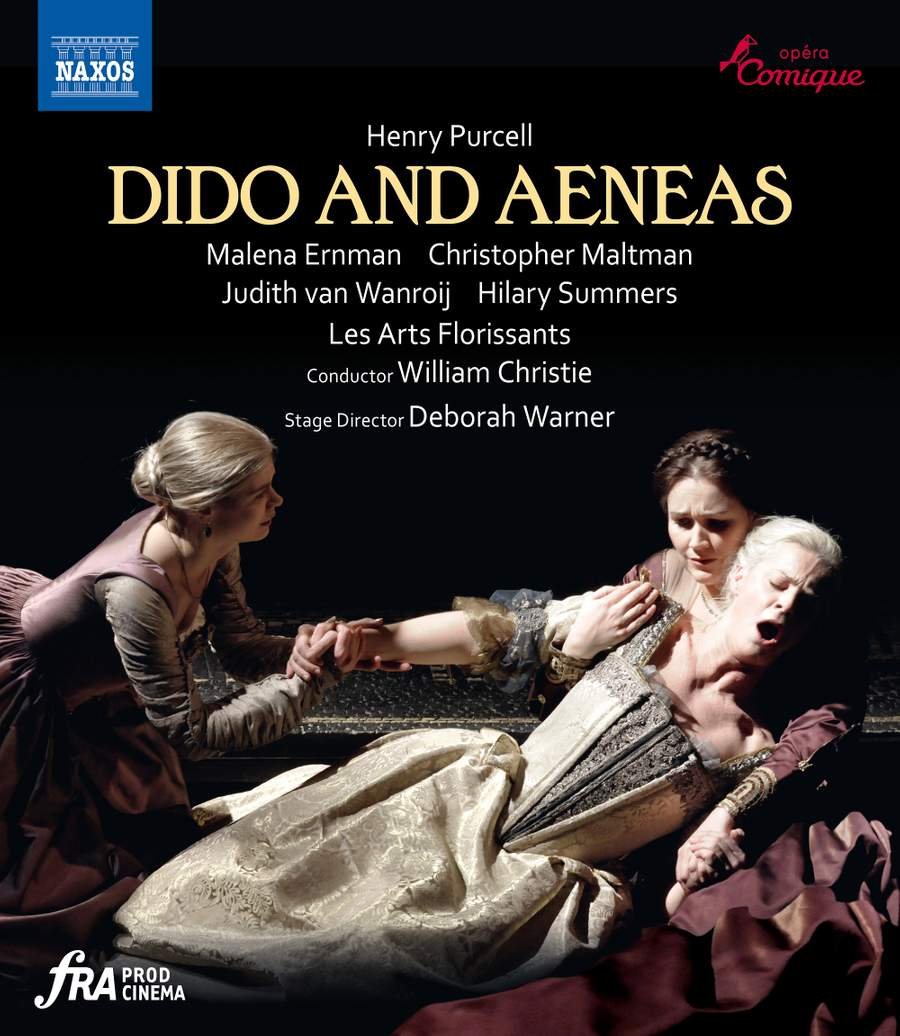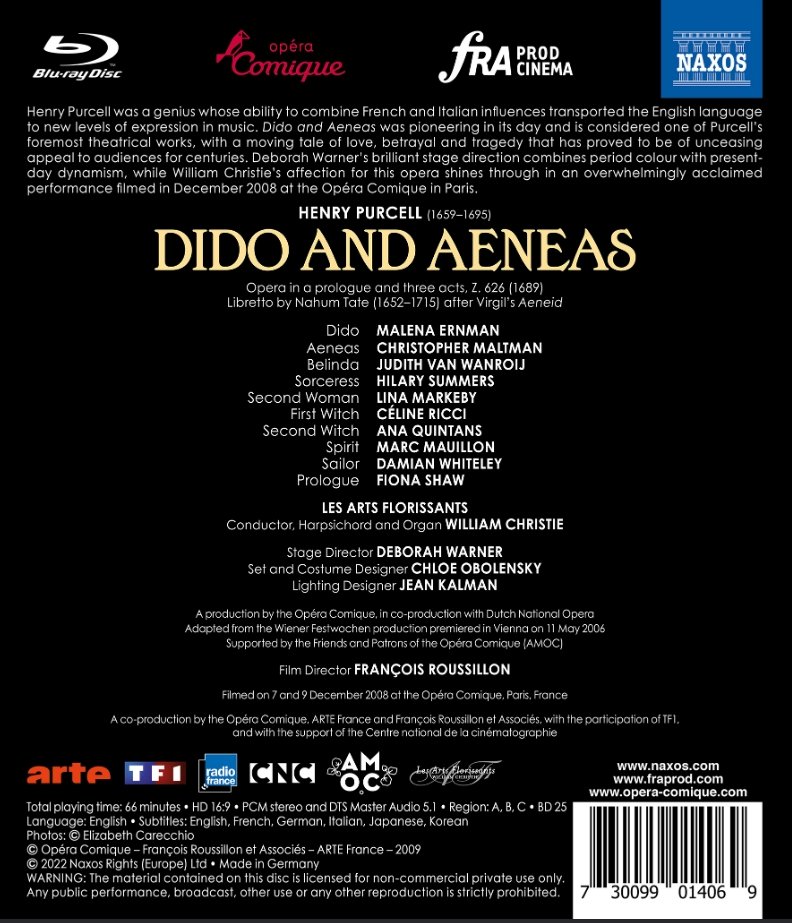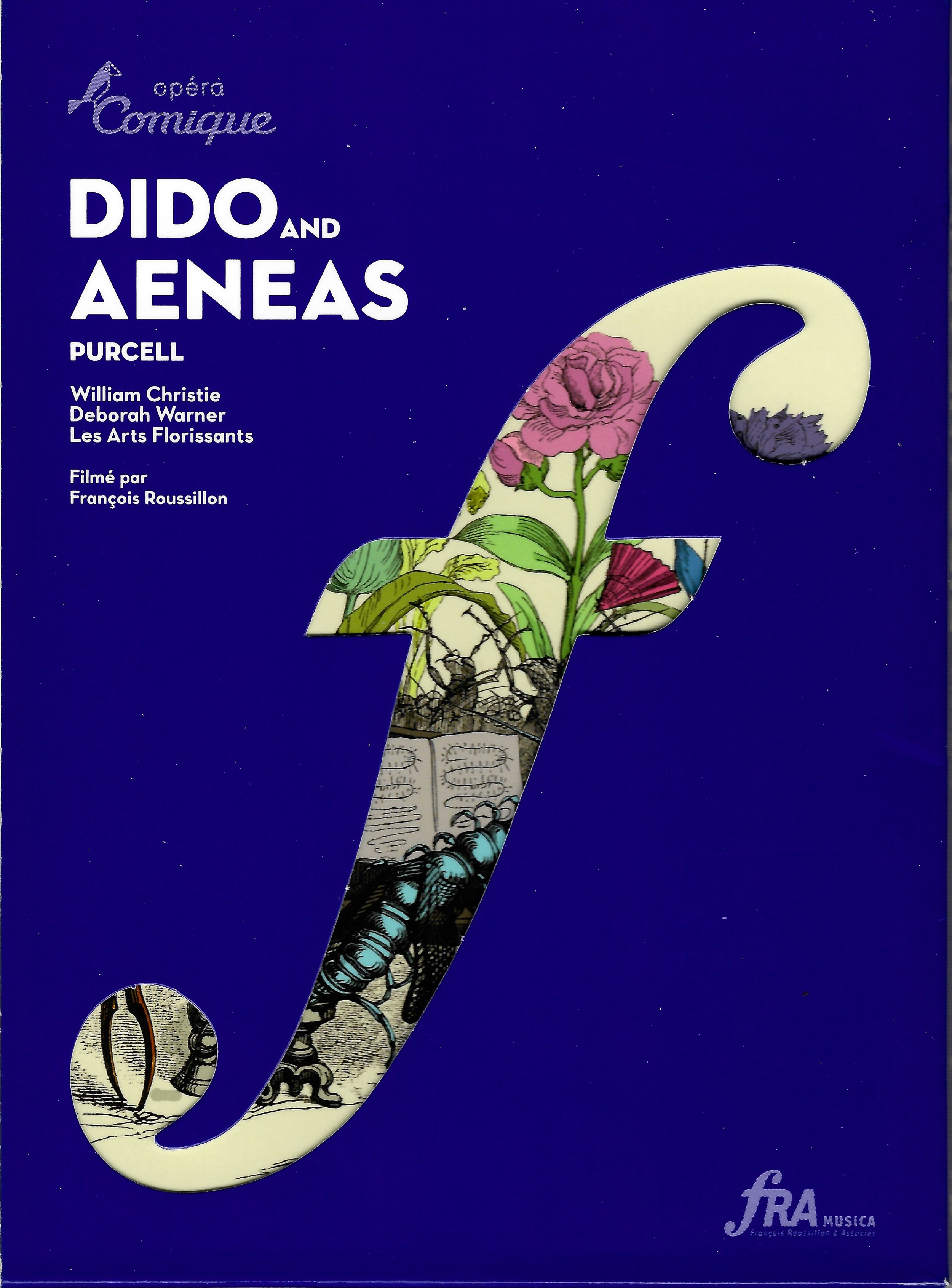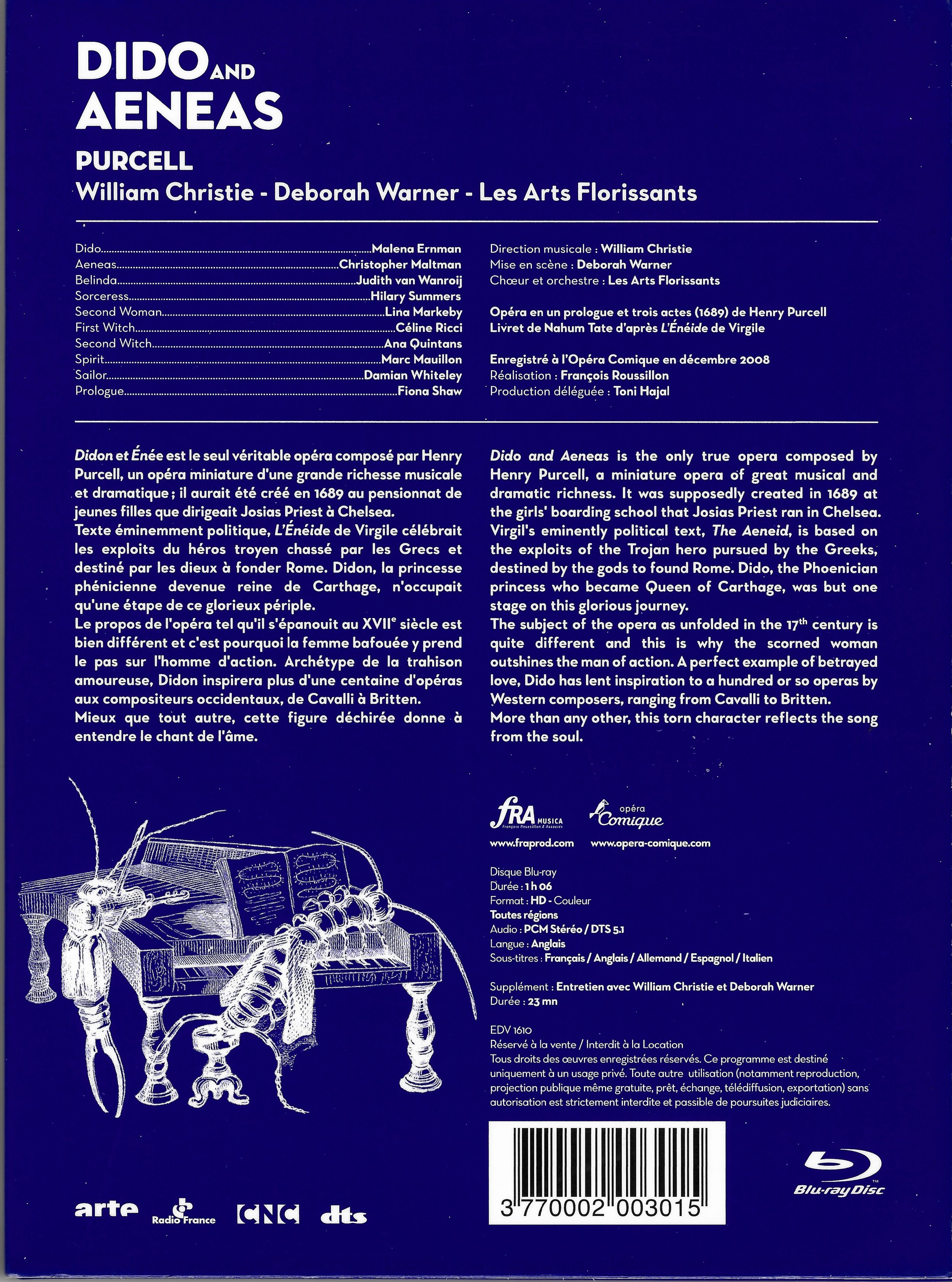



Henry Purcell Dido and Aeneas opera to a libretto by Nahum Tate. Directed 2008 by Deborah Warner at the Paris Opéra Comique. Stars Malena Ernman (Dido), Christopher Maltman (Aeneas), Judith Van Wanroij (Belinda), Hilary Summers (Sorceress), Lina Markeby (Second Woman), Céline Ricci (First Witch), Ana Quintans (Second Witch), Damian Whiteley (Sailor), and Marc Mauilon (Spirit). Fiona Shaw speaks the Prologue. William Christie conducts Les Arts Florissants Orchestra and Choir (Chorus Master François Bazola). Sets and costumes by Chloé Obolensky; lighting by Jean Kalman. Directed for TV by François Roussillon; produced by Tony Hajal and David Kulas. Sung in English. Released 2022, disc has 5.1 dts-HD Master Audio sound. Grade: A+
This originally came out in 2010 published by FRAmusica in its distinctive design with the “cut-through” front cover shown above in deep blue. Eventually this went “out of print” and became a collectors’ item. Naxos now has the rights to this and has reissued it with new artwork seen on the left in the gallery above. (It seems Naxos will republish all the wonderful early FRAmusica titles that went out of print.) Bravo Naxos!
This is a beautiful, zany, short production of a fine baroque opera. But to fully enjoy it, you may need same background.
First, we should review who Dido and Aeneas were. Aeneas was a Trojan prince whose mother was Aphrodite (Venus), the goddess of the sex drive and fecundity. When Troy fell, the gods send Aeneas to Italy to be the father of the Roman people and nation. The Roman author Virgil wrote the epic poem The Aeneid as a literary and moral constitution for the newly formed Roman Imperial state headed by Augustus, the first Roman Emperor.
The Aeneid was a retelling of Homer's The Odyssey with Aeneas as the hero instead of Odysseus. Dido was the Queen of Carthage, a port on the coast of North Africa. The winds carried Aeneas to Carthage, where he met and had an affair with Dido. To Aeneas, Dido was just another temptation to overcome and leave behind on his way to Italy. All of this was important to the new imperial family in Rome. It allowed them to claim that they were descended from the goddess Aphrodite. All the lives lost in their incessant wars and savage blood sports would easily be replaced with new offspring of citizens and slaves alike. The death of Dido was fiction. But in a few decades the Romans in fact utterly destroyed the rival city of Carthage and the peoples of North Africa never recovered from this.
The Purcell baroque opera Dido and Aeneas (about 1689) had a prologue of which there is now no trace. This gave director Warner carte blanche to create her own. And how more creative could one be in an opera prologue than to come up with 6+ minutes of recitation of obscurely related classical and English literature delivered by a stage actress with no music at all? What Warner put together does make sense, but only a English speaking person with a PhD in English Literature would be able to track Warner's prologue in a theater. And this Warner served up in English to a French audience!
Well, I'll attempt to give our readers in Argentina, Germany, Lithuania, Pakistan, China, and Korea, etc. a start on an explanation of the following 4 literary passages that are involved in Warner's prologue:
Ovid's Narcissus and Ecco story from the book Metamorphoses
The Waste Land poem of T.S. Elliot
Shakespeare's Tempest, and
Yeats' poem He Wishes for the Cloths From Heaven
Hang on and you will be able to enjoy Warner's 6-minute prologue like an English language professor! Or skip down to the fifth screenshot where the singing begins.
Passage 1: Ovid's book Metamorphoses was plagiarized so much by Shakespeare and other English writers that it seems now to be an honorary title of English literature even though it was written in Latin shortly after The Aeniad. Here we have a dramatization of Ovid's Narcissus and Ecco story from Metamorphoses. The dramatization is recited by actress Fiona Shaw playing the roles of both Narcissus and Echo. This part of the Prologue is easy enough to understand. Narcissus stands for Aeneas. Ecco stands for Dido, who, although a Queen of a thriving country, falls for a man who, she hopes, will love and nourish her. Below we see Fiona Shaw launch into the Narcissus and Ecco dialogue:
So far so good. But now we must tackle Passage 2: lines 111 to 136 of the brutally esoteric poem, The Waste Land. But hang on, before we can master The Waste Land, we also need to take a detour into Shakespeare's Tempest for Passage 3. Of all the vast writings of Shakespeare, his most popular poem is the following song about a man who drowned at sea:
Full fathom five thy father lies;
Of his bones are coral made;
Those are pearls that were his eyes;
Nothing of him that doth fade,
But doth suffer a sea-change
Into something rich and strange.
Every line of this Passage 3 song has worked its way into the lore of English-speaking peoples in countless ways. You soon will see one of these ways in our segment from Passage 2, The Waste Land, which begins:
The statement "My nerves are bad tonight" comes from line 111 of The Waste Land. Here next I give you lines 111 to lines 136 of The Waste Land. It's another dialogue a bit like that between Narcissus and Echo. The lines in quotes are spoken by a neurotic woman desperate to communicate with her man. The lines without quotes and in italics are the man's responses. The man has no energy for his relationship to the woman. He is worried about external, objectively threatening things happening around them. When the woman demands to know his thoughts, he quotes something inane from Shakespeare that everybody knows. The man has no time for small talk---he's waiting for a knock on the door.
“My nerves are bad tonight. Yes, bad. Stay with me.
"Speak to me. Why do you never speak. Speak.
"What are you thinking of? What thinking? What?
"I never know what you are thinking. Think.”
I think we are in rats’ alley
Where the dead men lost their bones.
“What is that noise?”
The wind under the door.
“What is that noise now? What is the wind doing?”
Nothing again nothing.
“Do you know nothing? Do you see nothing? Do you remember
“Nothing?”
I remember
Those are pearls that were his eyes.
“Are you alive, or not? Is there nothing in your head?”
But O O O O that Shakespeherian Rag— [deliberate misspelling, but we will not get into that]
It’s so elegant
So intelligent
“What shall I do now? What shall I do?
"I shall rush out as I am, and walk the street
“With my hair down, so. What shall we do tomorrow?
“What shall we ever do?”
The hot water at ten.
And if it rains, a closed car at four.
And we shall play a game of chess,
Pressing lidless eyes and waiting for a knock upon the door.
The waste-land woman stands, of course, for Dido. The man waiting for the knock on the door is Aeneas waiting for a sign from Jove to sail for Italy.
I couldn't resist including this screenshot where Shaw makes herself look like a man:
Passage 4 in the prologue is the Yeats poem. The speaker in this poem is Yeats himself (I think). In our prologue, the speaker is Dido, and the poem works fine with a woman's voice. Dido isn't exactly poor, but she has nothing to offer Aeneas except her dreams. Those dreams will be dashed. (I changed the pronoun in the title):
“She Wishes For the Cloths From Heaven”
HAD I the heavens' embroidered cloths,
Enwrought with golden and silver light,
The blue and the dim and the dark cloths
Of night and light and the half-light,
I would spread the cloths under your feet:
But I, being poor, have only my dreams;
I have spread my dreams under your feet;
Tread softly because you tread on my dreams
This ends our dissertation on the Warner Prologue. Let's move on now to the musical body of the opera, which is much easier to understand!
In the next screenshot, we see Dido (Malena Ernman). She is a grieving widow. She is also the Queen of Carthage, burdened with all the dangerous affairs of state. She is shocked to see how she has fallen for this strange visitor Aeneas and how — hoping to see a King in charge again — she has spread her dreams under his feet. Her sister Belinda (Judith Van Wanroij on the left) and The Second Woman (Lina Markeby) encourage this new love:
Aeneas (Christopher Maltman) knows that he is bound by fate for Italy, but his sense of duty is overcome by love:
Dido has mysterious enemies, a coven of witches led by a Sorceress (Hilary Summers):
The mad-cap Sorceress is joined by the even wilder First Witch (Céline Ricci on the right) and Second Witch (Ana Quintans on the left) in dreaming up disasters for:
Dido and Aeneas are enjoying a picnic:
The witches conjure up a storm. Dido and the guests flee to the palace. A demon sent by the witches takes on the form of Mercury (Marc Mauilon) and accosts Aeneas with a bogus order for him to set sail immediately for Italy:
Aeneas wants to stay a while partly for the pleasure of it and partly for business. Why not make a marriage and a treaty with Carthage before starting back again on his dangerous trek?
But the witches will prevail:
Aeneas tells the sailors to prepare to weigh anchor. The witches send the sailors off with manic waves of obscenities:
One sailor gives back as good as he gets:
Now Aeneas must face Dido and try to work something out. What shall he do? He opens negotiations with an offer to disobey Jove and stay for the sake of love:
Dido will hear nothing of it. Aeneas has already turned into rags the dreams she laid beneath his feat:
Crushed by losing both the loves of her life, Dido takes poison. In this image from grandmaster painter Roussillon, she is already blind from the drug:
Tears now evoked by strains sublime, uttered by a chorus divine:
Roussillon moves in closer as death arrives:
And now concludes with a switch to the long, lonely view:
I'll add a few shots from the curtain calls. The chorus divine---Maud Gnidzaz, Violaine Lucas, Brigitte Pelote, Isabelle Sauvageot, Sheena Wolstencroft, Sean Clayton, Jean-Xavier Combarieu, Bruno Renhold, Marcio Soares, Nicolas Maire, Thibaut Lenaerts, Jean-Yves Ravoux, Michael-Loughlin Smith, Laurent Collober, David Le Monnier, and Damian Whiteley:
Here are the acrobats who do striking work in several scenes which can't be captured in screenshots. These guys don't look all that strong, but they can climb a rope up into the fly space. They are Sébastien Bruas, Romulo Pelizza, Loïc Reiter, Willy Grasman, Nicolas Comicci, and Tomas Van Uden:
And what did all these school girls do in the show? Do you expect me to tell you everything? Here are their names: Loubna Abdelli, Tara Aïta, Sabine Audelin, Constance Aupetit, Alexandra Babiau, Clara Babiau, Marie Beaujeux, Alexandra Bibaut, Lilia Boukaïba, Aurore Bresset, Tara Buzdon, Jade Castel, Sara Stéphanie Cavrel, Jade Cenderelli, Jasmine Chazelas, Lucie Courcier, Adèle Courcier, Apolline D'Andlau, Lou Darmangeat, Jinane Dolbec, Yandé_Fall, Thaïs Fischer, Shaïnés Foughali, Sirine Guiot, Zoé Guiot, Sofia Hansson, Charlotte Issaly, Neige Jumeau, Adélie Laforge, Agnès Leblanc, Olivia Lindon, Chloé Maire, Lucile Malavergne, Alexia Marouani, Sarah Massart-Weit, Clémence Meunier, Inès Nadal, Marie Obolensky, Garance Perrois, Kimberley Pregasse-Antoine, Capucine Pulisciano-Fernez, Ursula Ravelomanantsoa, Anna Robyn, Leila Schütz, Constance Sichel, Wanda Simalty, Laetitia Tibi, Gabrielle Tort, Absa-Diatou Touré, and Tanisha Tshisekedi.
Wow! Now I must bring this odd review to a close and give a grade.
After its first known performance in 1689, this work was scarcely performed for hundreds of years. But in modern times, it's been recreated and produced to the point that it's a popular favorite. One can now argue posthumously that Purcell is the father of English opera (like his contemporary Lully is considered the father of French opera). Never mind that the opera progeny of Purcell was pretty sparse right up to Benjamin Britten.
The singing and acting of all the principals is excellent. Les Arts Floresants orchestra plays brilliantly, and their chorus eats nothing but ambrosia. Avuncular Christie is seen grinning and having a ball. The sound recording is excellent.
With the FRA folks at work, PQ and video content are complete satisfying. FRA also has set out to make the most beautiful HDVD packages on the market. You know this right away when you open the custom-made presentation case with a clever slip cover, 32-page collectors booklet packed full of information and credits, and artfully crafted holder for the single disc.
Warner manages, with her clever prologue and surprise after surprise in the action, to create (in about an hour) a kind of proxy for all English literature ranging from classical antecedents, through Shakespeare (with his penchant for mixing comedy and tragedy in narrow roads of giddy switchback curves), right up to the cryptic expressionism of Elliot and the humanism of Yeats. In other hands, all this might seem like Regietheater. But as executed by Warner and Christie, it manages somehow to seem a logical and fitting way to deal with Purcell's obscure music and Dido's sad story. What I can't get across in this review is the frantic pace of the action---you have no time to be bored. So if you have laughs and tears, prepare to mix them now. Grade: "A+"
The death of Dido sung in English with French subtitles:
Buy at
























